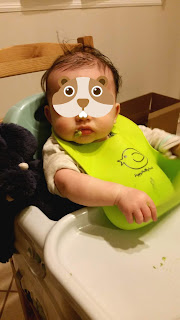How is everyone doing this week? We've been relishing the warm weather and enjoying having dinner on our balcony! It's the simple moments like these that have been bringing us little rays of joy in our days.
May is Asian Pacific American Heritage Month! I thought it would be fun to write a post about what books we have been reading here that are about and/or by Asian-Americans--toddler reads as well as adult fiction reads. Even though your local library may not be open, support these authors buy purchasing their books from your favorite book seller!
Toddler Reads: Books by Asian-Americans, Books About Asian-Americans
We really love all of Grace Lin's books (I shared two of them in our posts about
welcoming fall and about
Chinese New Year), and lately we have been really into
Dim Sum for Everyone, mostly reminiscing about the last time we went to dim sum with my mom, and talking about how we probably won't be going anytime soon 😒
Mama Bear and
Konichiwa! were books I received during student teaching, and both I like because they show Asian-American children's daily lives. Silly Bean really loves looking at the pictures and asking questions about them, and I love that he gets to glimpse into the lives of other Asian-American children.
Ellie is a sweet little story about an elephant finding her own talent and using it to save the zoo. It's colorful, has an endearing little story, and has animals--great for kids! Not Asian-American in the story per se, but the author, Mike Wu, an illustrator with Pixar, is Asian-American.
Five Thousand Words is an Usborne book given to Silly Bean by some friends. We use it mostly as a "what do you see in this picture?" and to practice our Chinese. It's in simplified Chinese and uses Mandarin ping ying, which is not my preference as we are Cantonese, but it's really hard to find Chinese books for kids nowadays so we'll take what we can get!
And Silly Bean loves
Moana--the music, them movie, the book, all of it. I thought I would include this because for a time it was Silly Bean's favorite book (it's just a Golden Books version of the story using pictures from the movie) and because Pacific Islanders are often forgotten or less thought of in the AAPI acronym, and we are celebrating their heritage this month as well!
Adult Reads: Young Adult Asian-American Literature
I love young adult literature, even now--contrary to popular belief, there are often well-written stories that seamlessly incorporate current events/trends/issues, which I think is great, and often there is growth and self-actualization that happens in the characters. Growing up, I didn't really see/read about young adult characters who looked like me, but lately there has been an increase in Asian-Americans publishing books with Asian-American characters as the protagonist. I am so excited to see myself or see my friends in these stories and the experiences we have be normalized and shared with the world without me having to be the cultural narrator/translator.
Frankly In Love tells the story of Frank Li, a Korean-American high school guy, and the lengths he goes to fake date a family friend (also Korean-American) to cover up his actual relationship with a white girl. It also explores issues like race/racism/ethnic identity through interactions among the characters. Even though I am not Korean, I related to many parts in this story.
Loveboat, Taipei, is about a recently graduated Chinese girl who dreams of studying dance in college, but that conflicts with her parents' desire for her to become a doctor. She is sent away to Taiwan for the summer to a cultural program to learn about her roots, and it is there that she learns about herself. I thought this book was so well written from beginning to end--in addition to the arc of the storyline being well-done, the actual writing is great and there is so much that is shown and not told.
What have AAPI literature have you been reading lately that you'd recommend?


















